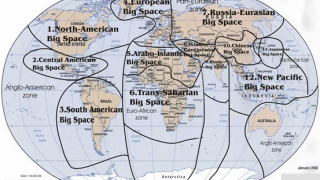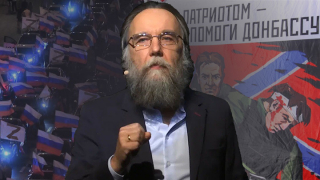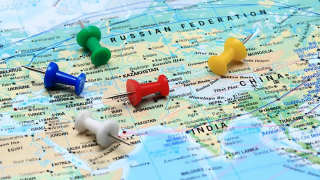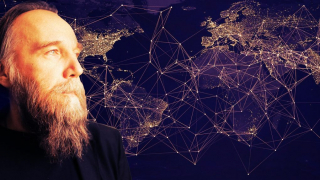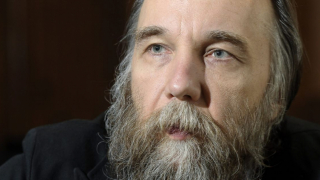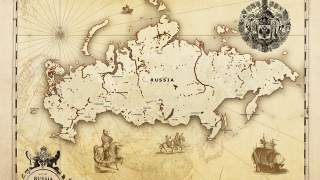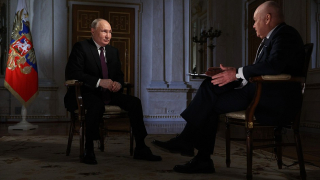Dromocracy. Speed as power
In today's world, speed plays a key role. In everything. In SMO, we have found that even in modern warfare, it is one of the key factors. Much, or almost everything, depends on how quickly one is able to obtain information, communicate it to the commander of a firing unit, make the decision to strike, and promptly change the location of the firing position. Hence the enormous role of UAVs and drones, satellite communications, the time taken to transmit the enemy's coordinates, the mobility of combat units, and the speed at which orders are communicated to the enforcer. It is clear that this aspect was underestimated in the preparations and we must now rectify this in a critical environment.
Similarly, we have underestimated our dependence on the West for digital technology, chips and precision manufacturing. Preparing for a head-on confrontation with NATO and at the same time relying on technological elements developed and produced in NATO countries or Western-dependent states is not evidence of great intelligence.
However, I will now discuss not the dependence on the West, but the speed factor. The French philosopher Paul Virillot, who studied the importance of speed for modern technical civilisation, proposed a special term: dromocracy. From the Greek dromos (speed) and kratos (force, power). Virillo's theory is based on the assertion that in the new conditions of civilisation, it is not the stronger, smarter or better equipped who wins, but the faster. It is speed that decides everything. Hence the desire to increase by all means the speed of processors and, consequently, of all digital operations. This is at the heart of most thinking about technical innovation today, everyone competes precisely in speed.
Today's world is a struggle for speed and whoever proves to be the fastest wins the ultimate prize: power. In all its meanings and dimensions: political, military, technological, economic, cultural.
Meanwhile, in the structure of the dromocracy, the most valuable thing is information. The speed at which information is transmitted is the concrete expression of power, and this applies both to the functioning of the world's stock exchanges and to the conduct of war. Whoever is able to do something faster gains complete power over those who hesitate.
At the same time, dromocracy, as a consciously chosen strategy, i.e. as an attempt to dominate time as such, can also lead to strange effects. The future factor comes into play. Hence the phenomenon of forward transactions and their hedge funds, as well as other financial mechanisms of a similar nature, in which the main transactions concern something that does not yet exist.
The ideal of the media dromocracy would be to be the first to report on an event that has not yet happened, but is most likely going to happen. It is not just fiction, it is working with the realm of the possible, the probable, the prob-able. If we consider a probable future event as something that has already happened, we gain time and therefore power. Another thing is that it might not happen. Yes, and it is possible, but sometimes the failure of expectation is uncritical and, on the contrary, a confirmed prediction, taken as a fait accompli in advance, offers enormous advantages.
This is the essence of dromocracy: the time element is not very simple and whoever succeeds in subduing it gains total global power. In the development of super speeds, reality itself is deformed and the laws of non-classical physics, anticipated by Einstein's theory of relativity and to an even greater extent by quantum physics, come into play. Super speeds alter the laws of physics, and it is in this area that, according to Virillo, the planetary power struggle is taking place today.
Similar theories can be found in the more applied and less philosophical realm of network-centric warfare, and it is precisely this type of network-centric warfare that we encountered during the SMO in Ukraine. The main feature of such a war is the rapid transfer of information between individual units and command centres. To this end, soldiers and other combat units are equipped with multiple cameras and other sensors, whose information converges to a single point. This is supplemented by data from helicopters, UAVs and satellites. They are integrated directly with the combat and firing units and this complete network integration provides the most important advantage: that of speed. This is how HIMARS, mobile battle groups and DRGs operate. Starlink satellite communications have also been used for this purpose.
Theories of network-centric warfare recognise that speed of decision-making often comes at the expense of justification. There are many miscalculations, but if you act quickly, even if you have made a mistake, there is always time to correct it. The principle of hacking or DoS attacks is used here: the main objective is to hit the entire position of enemy troops, looking for weak points, a back door. Losses can be quite high, but the results, if successful, are quite significant.
Moreover, network-centric warfare includes open channels of information, primarily social networks, as an integral component. They do not merely accompany the conduct of hostilities, communicating, of course, only what is advantageous and what is not, hiding or distorting beyond belief, but also operate with a probabilistic future. Again, the principle of dromocracy. What we perceive as false today is nothing more than the probing and artificial stimulation of a possible future. Many fakes turn out to be empty, just as attempts to overcome hacking defences are often futile, but sometimes they achieve their goal - and then the system can be hijacked and subjugated.
Dromocracy in the political sphere makes it possible to deviate from strict ideological rules. In the West itself, for example, racism and Nazism are not, to put it mildly, openly encouraged, but an exception is made in the case of Ukraine and some other societies oriented towards defending the geopolitical interests of the West. Anti-Russian Nazism and Russophobia are flourishing there, but the West itself does not realise it, cleverly avoiding it. The fact is that for rapid nation-building where it has never existed, and when there are in fact two peoples on one territory, nationalism cannot be dispensed with. To do this as quickly as possible, extreme forms are required, including outright Nazism and racism. Again, this is a question of dromocracy. It is necessary to quickly create a simulacrum of a nation. To this end, one takes a radical ideology, all the images and myths about one's own exceptionalism, even the most ridiculous ones, and all this is quickly put into practice (with full control of the sphere of information, in the end Western societies simply do not notice).
What follows is an equally accelerated propaganda of these ideas, which have nothing to do with Western liberal democracy. What follows is war, and the aggressors are portrayed as victims and the saviours as executioners. The important thing is to control the information and if everything goes according to the globalists' plans, a quick resolution follows, after which the neo-Nazi structures themselves are just as quickly eliminated. Almost the same thing we saw in Croatia during the break-up of Yugoslavia. First the West helps the Croatian Nazis - the neo-Nazis - and arms them against the Serbs, then cleans them out in turn so that no trace of them remains. The important thing is to do everything very, very quickly. Neo-Nazism appeared quickly, played its role quickly and disappeared quickly, as if it had never happened.
This is precisely Zelensky's secret. The mercurial comedian was not chosen as ringleader by chance. His psyche is volatile and prone to rapid change. The perfect politician for a fluid society. One moment he says and does one thing, the next moment he does something completely different and no one remembers what happened a second ago, as the speed of information flow is constantly increasing.
In this context, what do we look like? As soon as we started to act quickly, decisively and almost spontaneously (the first phase of the SMO), huge successes followed. Almost half of Ukraine is under our control.
As soon as we started to slow down operations, the initiative passed to the enemy. It was here that it was discovered that the network-centric nature of modern warfare and the laws of dromocracy had not been properly taken into account. As soon as we took a reactive attitude and switched to defence and defence, we lost the speed factor. Yes, Ukrainian victories are mostly virtual, but in a world where the tail wags, where almost everything is virtual (including finances, services, information, etc.), this is not enough. The anecdote of the two Russian paratroopers on the ruins of Washington complaining - 'we lost the information war' - is amusing, but ambiguous. After all, it is also something virtual, an attempt to pro-babily encode the future. When it comes to reality testing, however, not everything is so simple. Here we either have to bring down the whole dromocracy, the whole virtuality, the whole network-centric postmodernity, i.e. the whole of modernity and the whole vector of the modern West (but how can this be done at once?), or accept - even if only in part - the rules of the enemy, i.e. accelerate ourselves. The question of whether we Russians will be able to enter the realm of dromocracy and learn how to win network-centred wars (including computer wars!) is not an abstraction. Our victory depends directly on it.
For this we must first understand - in a Russian and patriotic way - the nature of time. How slowly we understand everything, how backward we are and how slow we are to put it into practice - it even seems to belie the proverb that 'Russians take a long time to catch up, but they go fast'. This is precisely the time when, if we do not move very fast, the situation could become very dangerous.
The sooner we do it, the sooner we solve it. I am not even talking about equipping our soldiers with network attributes, speeding up the command process and introducing effective cyber security measures, but it is simply necessary to be on a par with a well-equipped enemy. And again: if the speculation about the price of minimum uniforms for the mobilised was not immediately followed by a rapid wave of direct reprisals by the authorities, it is a very bad sign. Someone in power imagines that we are still bridling, even though we are already running at full speed. This is something urgent to think about. Otherwise, we might be plunging, how can I put this delicately... a bit in the wrong direction.
Dromocracy is no joke. It is not about overtaking the West. It should be overwhelmed by its dizzying arrogance, but to do so we must act with lightning speed and in a sensible manner. Russia no longer has the right or the time to slumber and let go.
Translation by Lorenzo Maria Pacini




